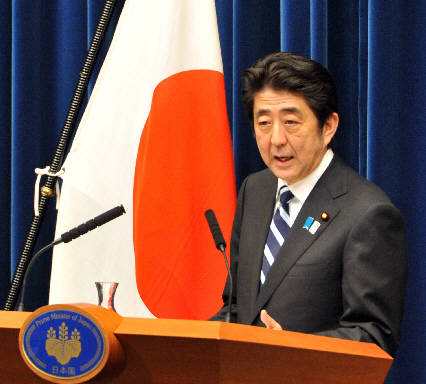
Prime Minister Shinzo Abe announced in a press conference at his official residence that Japan will take a seat at the negotiating table for the TPP talks, on March 15.
Prime Minister Shinzo Abe formally announced Friday, March 15, in a press conference at his official residence that Japan will take a seat at the negotiating table for the Trans-Pacific Partnership free-trade talks. Abe explained that it “is the last chance” for Japan to take part in the rule-making process of a free trade framework in the Asia-Pacific region, and expressed determination to defend the nation’s interests, saying that the government will “protect what should be protected, and gain what should be gained.” There is no guarantee, however, that the key agricultural products, which the Liberal Democratic Party indicated as exceptions, will be exempted from tariff elimination, and the agricultural groups and consumers’ groups nationwide are unanimously voicing strong opposition against Abe’s decision. With TPP member nations hardly disclosing any information on the ongoing negotiations, many are worried that the Japanese people will not be informed enough to judge whether the negotiations go against national interests. The government is likely to go under stronger pressure to withdraw from the negotiations as early as possible.
The government also unveiled on the same day its new estimate of the possible economic impacts of joining the trade initiative, showing that production in the agriculture, forestry and fisheries sector could decrease by ¥3 trillion annually if all tariffs are abolished. To enhance the framework for negotiations, the government assigned economic revitalization minister Akira Amari to double as the minister in charge of TPP affairs.
“We will work on paving the way to serve the best interests of the nation,” Abe said in the press conference. “The most important national interest is Japan’s unique nationality which we can take pride in worldwide,” he said, stressing his determination to defend the traditions and culture of agricultural communities and the nation’s universal healthcare insurance system. In addition to helping strengthen competitiveness of the nation’s agricultural sector, he said the government will give special support to farmers in mountainous areas and areas struck by the 2011 earthquake and tsunami.
He declined to answer whether Japan would withdraw from the discussions if it fails to protect the national interests as called for by the LDP, saying that commenting on whether to withdraw at this point would rather go against such interests and that the government will negotiate aggressively to achieve good results.
At the same time, Abe admitted that Japan will face a tough negotiation as a latecomer, saying “it is absolutely clear that it will be difficult to overturn rules already set” by the 11 TPP member countries in past rounds of talks. There are reports that Canada and Mexico, other latecomers in the TPP negotiations, have been asked to accept at least two considerably disadvantageous conditions for joining the talks. First condition stipulated that they would not be able to renegotiate any issues already agreed upon among other TPP members. The second condition was that they would not have veto rights over decisions which will be made in the future by 9 original member nations.
In the preliminary talks with the United States, Japan reportedly made significant concessions concerning U.S. tariffs on car imports, the area where Japan could have been on the offensive. On the other hand, as for the issue of maintaining tariffs on Japan’s key agricultural products, Agriculture, Forestry and Fisheries Minister Yoshimasa Hayashi told reporters after a Cabinet meeting held on the same day that the two countries “have not negotiated on rice (which is one of the key products) so far,” adding that he has not been informed of whether it will be on the negotiating table in the future. His words indicate that the tariffs on key agricultural products are unlikely to be discussed in the bilateral preparatory negotiations, and many voice concerns that Japan will be facing an uphill battle in the actual round of talks and that there is a danger of Japan giving up its national interests once it joins the negotiations.
After meeting with the leaders of the LDP’s Headquarters for Regional Diplomatic and Economic Partnership on Thursday, March 14, and with the leader of the LDP’s coalition partner, New Komeito, on Friday, March 15, Abe informed the Cabinet ministers of his decision to join the TPP negotiations as they met for the Headquarters for Japan’s Economic Revitalization on Friday, March 15.
(March 16, 2013)

